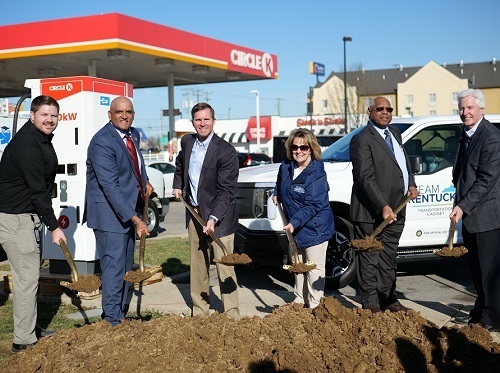The Federal Highway Administration recently made $250 million available, over five years, in competitive grants to support multimodal solutions that reduce vehicular traffic and air pollution in heavily congested metropolitan areas across the United States.
[Above photo by Ohio DOT]
The FHWA said its new Congestion Relief Program – created by the Infrastructure Investment and Jobs Act (IIJA) – is now accepting applications for the first round of grants via a notice of funding opportunity, which provides $150 million in grants for fiscal years 2022, 2023, and 2024. The agency stated that these grants are available to states, metropolitan planning organizations, cities, and municipalities for projects within urban areas with a population of at least one million.
[Editor’s note: The Ohio Department of Transportation recently unveiled new system designed to detect traffic congestion and subsequently warn motorists of dangerous “slow-downs” at 13 highway sites in and around major urban centers across Ohio identified by the agency as “high-congestion, high-crash” areas.]
FHWA added that its new Congestion Relief Program provides grants to projects that reduce highway congestion and the economic and environmental costs associated with congestion, including pollution from transportation emissions. The agency noted that the program also optimizes existing highway capacity and transit systems, improves coordination with transit, and encourages other modes of travel.
According to FHWA, eligible projects include the deployment and operation of integrated congestion management systems, certain transit and mobility services, and incentive programs encouraging travelers to carpool, use transit, or travel during nonpeak periods. The agency added that it will “give priority” to projects that advance multimodal solutions for heavy traffic volumes in urban areas experiencing a high degree of recurrent congestion.
[Editor’s note: The Colorado Department of Transportation launched a new Bus Rapid Transit or BRT program for the Denver region in November 2023 designed in part to reduced congestion-related travel delays for bus riders. The agency said that BRT is a high frequency service designed to be “more reliable, convenient, and accessible” than traditional bus service; reducing delay points that can typically slow regular bus service, such as making long stops or getting stuck in traffic at intersections.]
“Traffic congestion without multimodal options is a major problem throughout America, especially in large metro areas, significantly limiting mobility and reducing clean air quality in our cities – while diminishing productivity nationwide because of higher costs when people and goods are delayed in traffic,” said FHWA Administrator Shailen Bhatt in a statement.
“With this program, we’re aiming to tackle congestion and provide a higher standard of living and greater multimodal options and working for the people in populated areas,” he noted.


